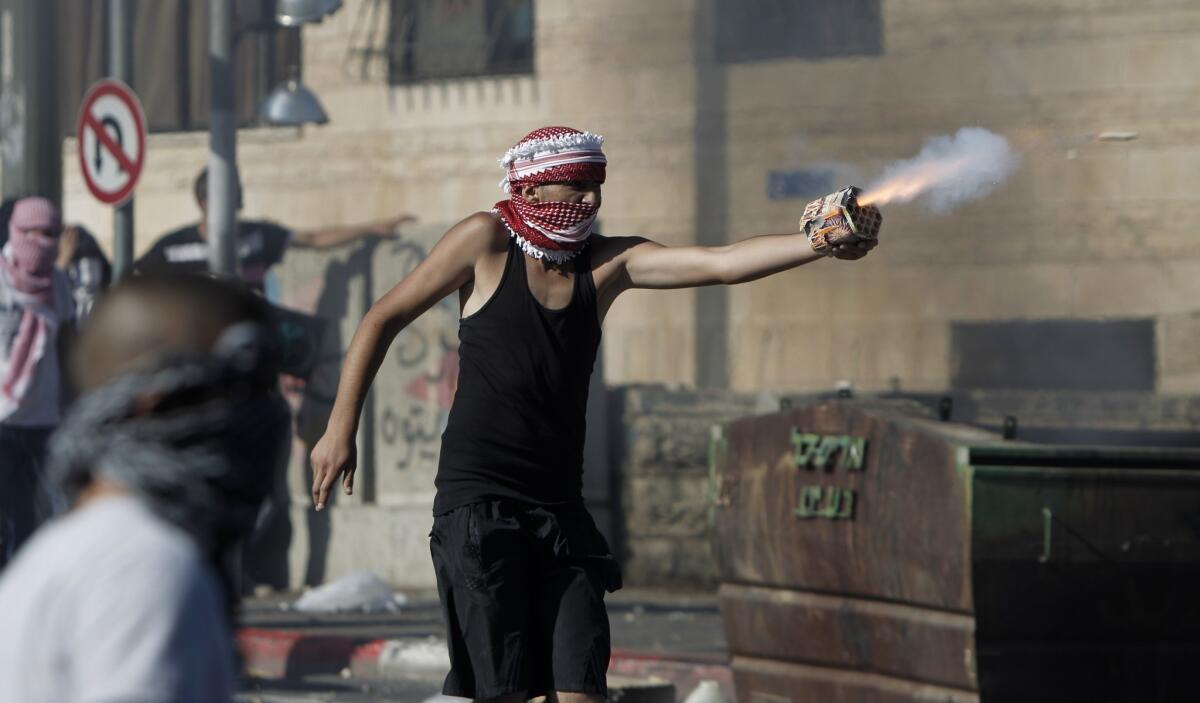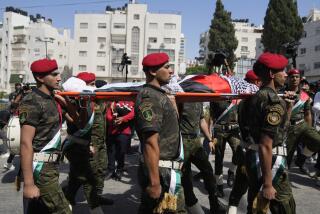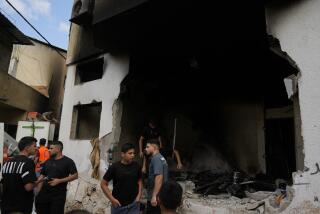Slaying of Palestinian teen stokes fear of new intifada

The apparent kidnapping and killing of a Palestinian teenager Wednesday triggered some of the worst violence Jerusalem has seen in years, stoking fear of a new intifada and prompting calls from both sides for restraint.
There was speculation that the death of 17-year-old Mohammed Khdair was intended as retribution for the abduction and killing of three Israeli teenagers, whose funerals Tuesday prompted a national outpouring of grief. Israeli and U.S. leaders were quick to denounce the Palestinian’s killing, which Prime Minister Benjamin Netanyahu called “reprehensible.”
A relative said the youth was sitting on a fence outside his house in a Palestinian neighborhood in Jerusalem about 3:45 a.m. Wednesday when a car did a U-turn in front of him. Someone called the teen over and then forced him into the vehicle, said the relative, who identified himself only as Mahmoud.
Mohammed had been waiting for early morning prayers at a nearby mosque and a predawn meal before starting his daily Ramadan fast, Mahmoud said. His charred body was found in a wooded area on the other side of Jerusalem a few hours later.
While police continued to investigate the crime and its motive, residents of Jerusalem’s Palestinian neighborhoods exploded in rage, believing the teen had been killed by Jewish extremists in reprisal for the Jewish teens’ deaths in the West Bank.
“Clear and simple. He was murdered for nationalistic, racist and vengeful reasons,” Mahmoud Abu Khdair, an imam at a mosque who is also a relative of the teenager, told Israel’s Channel 2.
In scenes reminiscent of Palestinian intifadas, residents clashed with police forces, throwing firebombs, other explosive devices and thousands of rocks in a 12-hour outburst that left a key traffic artery strewn with stones, burned trash bins, shattered glass and empty tear-gas canisters.
As the violence spread, so did the concern of the government and police, who were aware of possible consequences of the killing and subsequent outrage. The recent collapse of U.S.-brokered peace talks added to the tension.
In language somewhat similar to what he used to describe the killing of the three Israeli teens, U.S. Secretary of State John F. Kerry described the death of the Palestinian youth as “despicable and senseless.” He called on all sides to “do everything in their power to protect the innocent and act with reasonableness and restraint, not recrimination and retribution.”
Earlier, Netanyahu called for a swift investigation of the killing and its motive and urged Israelis to refrain from taking the law into their own hands.
Justice Minister Tzipi Livni said there would be “zero tolerance” for the perpetrators, and promised that they would be found and tried.
“This is the difference between Israel and a terrorist organization,” she wrote in a Facebook post, and those “seeking to turn Israel into a terrorist society” must be punished heavily.
Palestinian Authority President Mahmoud Abbas, who had come under fire from some Palestinians for his strong denunciation of the abduction of the three Israeli teens, demanded a similar response from Netanyahu to Mohammed’s death.
Mohammed’s family consented to an autopsy overseen by a Palestinian observer on their behalf. But his father, Hussein Abu Khdair, was quoted as saying that he didn’t expect the investigation of his son’s death to lead to any charges.
In an interview with the New York Times, Khdair said, “I am against kidnapping and killing. Whether Jew or Arab, who would accept that his son or daughter would be kidnapped and killed? I call on both sides to stop the bloodshed.”
Public Security Minister Yitzhak Aharonovitch emphasized late Wednesday that the motive for the killing had not been determined. He urged the public to show restraint and patience while investigators worked on the case.
Friends of Mohammed reported seeing two or three people in the car when he was taken. The friends called police immediately, giving them a description of the car, photos and a license plate number, said Mahmoud, the slain youth’s relative.
“The police know who did this,” he told Israel Radio.
Three Israeli teenagers were indicted Wednesday for their part in another violent incident that took place Tuesday night, when a right-wing demonstration spun out of control and Jewish youths attacked Palestinian passersby and brawled with police in downtown Jerusalem.
A Facebook page demanding revenge for the three Israeli teens attracted a following of tens of thousands in recent days, as well as an outpouring of hatred and vitriol against Arabs.
However, hundreds of Israelis on Wednesday attended a rally in Jerusalem against racism and violence, under a banner stating, “We mourn, we don’t take vengeance.” The event was organized by Tag Meir, a coalition of organizations dedicated to fighting political and religious hate crimes and violence.
Separately, Yishai Frenkel, whose nephew Naftali was one of the three Israeli teenagers killed in the West Bank, issued a strong statement to Israeli news media on behalf of his family.
“If indeed an Arab youth has been murdered for nationalistic motive, this is a horrifying, shocking act,” Frenkel said in the statement published on Hebrew news sites. “There is no difference in blood. Murder is murder, whatever one’s nationality or age. There is no justification, no forgiveness and no atonement for any murder whatsoever.”
Sobelman is a special correspondent. Special correspondent Maher Abukhater contributed to this report from Ramallah.
More to Read
Sign up for Essential California
The most important California stories and recommendations in your inbox every morning.
You may occasionally receive promotional content from the Los Angeles Times.










